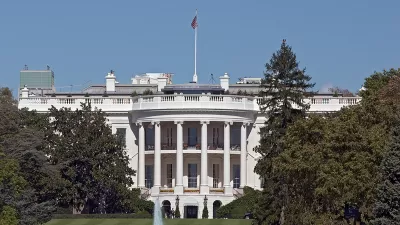It's the U.S. EPA, under the new acting administrator, against two top officers in the Department of Transportation. Both agencies (along with California) determine fuel efficiency standards. Guess which wants to proceed cautiously in the rollback?

"The rollback, one of the most consequential proposals of the Trump administration, not only would permit more planet-warming pollution from cars, it would also challenge the right of California and other states to set their own, more restrictive state-level pollution standards," reports Coral Davenport, energy and environment reporter for The New York Times, on July 27.
On one side is the Environmental Protection Agency’s acting chief, Andrew Wheeler, who has tried to put the brakes on the plan, fearing that its legal and technical arguments are weak and will set up the Trump administration for an embarrassing courtroom loss. Mr. Wheeler inherited the proposal from his predecessor, Scott Pruitt, who resigned on July 5 under a cloud of ethics investigations.
On the other side: Jeffrey A. Rosen, Deputy Secretary of the U.S. Department of Transportation, and Heidi King, Deputy Administrator of the National Highway Traffic Safety Administration. NHTSA, a division within USDOT, determines Corporate Average Fuel Economy (CAFE) standards.
According to Davenport, Rosen and King are also the chief authors of the rollback, which might come as a surprise as it was announced by Wheeler's predecessor. However, Davenport reported in March 2017 (via Planetizen) that a legal loophole made the rollback possible: Obama's EPA and USDOT hadn't announced their greenhouse gas emissions standards and CAFE standards, respectively, concurrently. Now it's clear that USDOT officials conceived that strategy.
Mr. Rosen and Ms. King have also justified their proposal with a new analysis concluding that the stricter Obama-era pollution rules would lead to thousands of deaths in road accidents. They argue that more fuel-efficient cars are less safe because they are lighter.
As to the delay on the official rollout of the repeal, Davenport reports that “a nuclear war” developed "between Mr. Wheeler on one side and Mr. Rosen and Ms. King on the other. Mr. Wheeler has sharply questioned the auto fatality numbers and fears that if they are proven faulty, that will undermine the legal case for the rollback, according to people familiar with his argument."
In a concurrent piece entitled, "Pruitt’s Successor Wants Rollbacks, Too. And He Wants Them to Stick," Davenport describes Wheeler's cautious approach to deregulation that makes him a more formidable opponent to the environmental community than his predecessor.
Prof. Richard L. Revesz, an expert in environmental law at New York University, said Mr. Wheeler was “trying to be more careful and less sloppy” than his former boss. “By taking time to improve the quality of the legal justifications, Wheeler may ensure that E.P.A. won’t be subject to losing on certain types of policies,” Professor Revesz said.
"Six of Mr. Pruitt’s efforts to delay or roll back Obama-era regulations — on issues including pesticides, lead paint and renewable-fuel requirements — have been struck down by the courts," reported Davenport and Lisa Friedman on April 7.
Last week, in one of his first administrative actions, Wheeler chose not to defend the last rollback of Pruitt's reign as administrator, the lifting of a restriction on the manufacturing of so-called glider trucks that are 55 times more polluting than trucks with new, rather than old or rebuilt, engines.
Update: On Monday, Stephanie Beasley of Politico Morning Transportation reports, "A proposed rule that would recommend holding fuel economy standards for cars and light trucks at 2020 levels is still on track to be released this week despite heated exchanges between EPA and DOT."
As for Davenport's reporting, she adds that sources say the differences between the two agencies have largely been resolved. An EPA spokesman "called reports of trouble 'categorically false'."
FULL STORY: Top Trump Officials Clash Over Plan to Let Cars Pollute More

Alabama: Trump Terminates Settlements for Black Communities Harmed By Raw Sewage
Trump deemed the landmark civil rights agreement “illegal DEI and environmental justice policy.”

Study: Maui’s Plan to Convert Vacation Rentals to Long-Term Housing Could Cause Nearly $1 Billion Economic Loss
The plan would reduce visitor accommodation by 25% resulting in 1,900 jobs lost.

Planetizen Federal Action Tracker
A weekly monitor of how Trump’s orders and actions are impacting planners and planning in America.

Grand Rapids Mayor Proposes Garage Conversion Plan
The mayor says allowing homeowners to convert garages to dwelling units could alleviate the city’s housing shortage.

Baltimore Ordered to Improve Sidewalk Accessibility
The city is one of many to face lawsuits for failing to comply with the Americans with Disabilities Act.

This Toronto Suburb Has More Bus Riders Than Columbus, Ohio
Brampton, Ontario used gradual improvements in service to prove that if you build it, they will ride.
Urban Design for Planners 1: Software Tools
This six-course series explores essential urban design concepts using open source software and equips planners with the tools they need to participate fully in the urban design process.
Planning for Universal Design
Learn the tools for implementing Universal Design in planning regulations.
Smith Gee Studio
Alamo Area Metropolitan Planning Organization
City of Santa Clarita
Institute for Housing and Urban Development Studies (IHS)
City of Grandview
Harvard GSD Executive Education
Toledo-Lucas County Plan Commissions
Salt Lake City
NYU Wagner Graduate School of Public Service




























